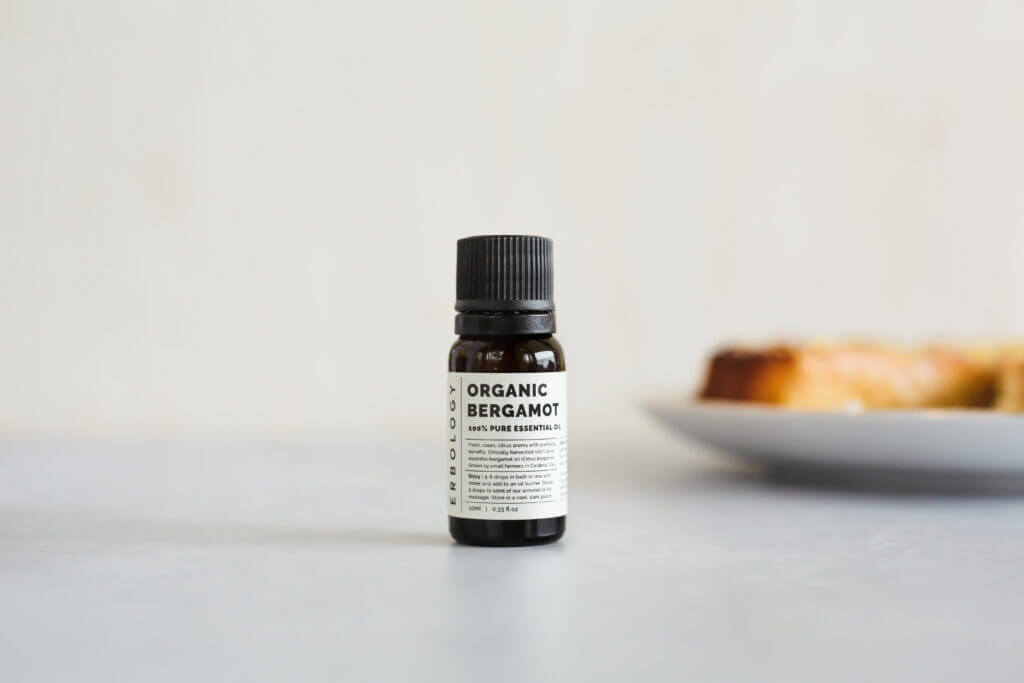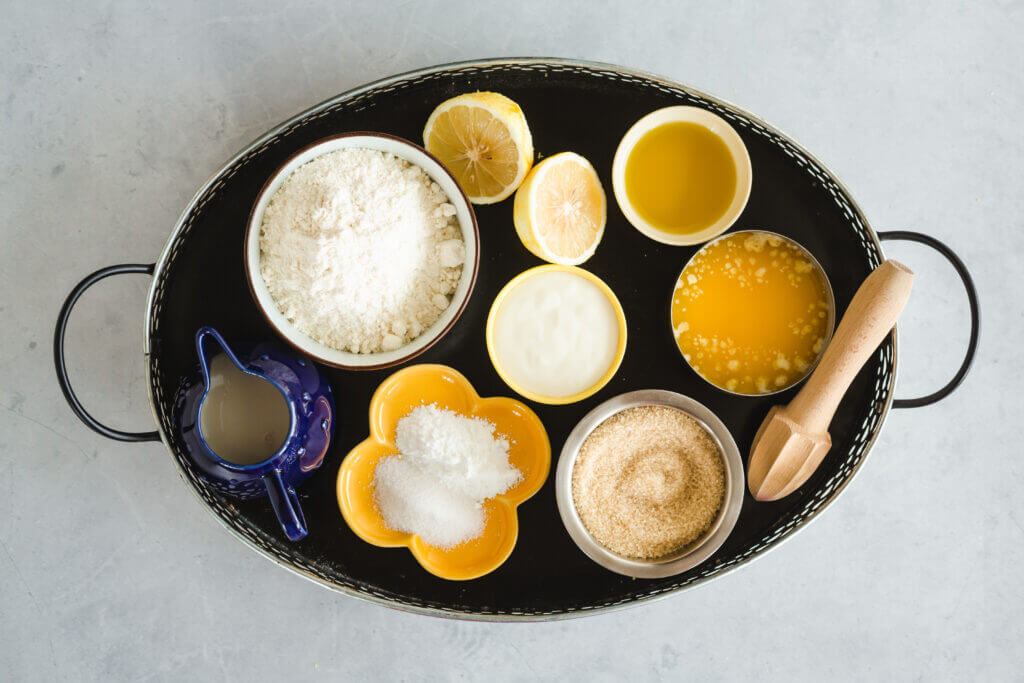Vegan lemon cake recipe
- 8

undefined 10'

undefined 45'

undefined

undefined
- 8

undefined 10'

undefined 45'

undefined

undefined
The beauty of bergamot
Bergamot is a fragrant citrus fruit that’s perhaps most famous for being the essence used to flavour Earl Grey tea. Thought to be a hybrid of sour orange and lemon, bergamot is usually too bitter to be eaten fresh. Instead, people use the zest, rind, and essential oil to harness the fruit’s distinctive floral scent and taste. From cookies and marmalade to this lemon cake recipe, bergamot can enhance all kinds of dishes. Its zesty floral spice pairs particularly well with other citrus flavours, as well as basil, ginger, rosemary, and cinnamon. Plus, of course, black tea! The fruit’s unique scent and broad compatibility with other fragrances may help to explain its popularity in perfumery. In fact, bergamot oil was one of the ingredients in the original Eau de Cologne, created in 1709. Today, you’ll find it in a wide variety of perfumes, colognes, soaps, and aromatherapy products. There are a couple of competing explanations for how bergamot got its name. Some claim it was taken from the name of the Italian town Bergamo. Others argue that it derives from the Turkish term ‘beg-armudi’, meaning ‘the prince’s pear’. Despite this, experts believe the plant likely originated in Southeast Asia, and from there it spread around the world. Nowadays, farmers grow bergamot from the Ivory Coast to China, although the vast majority is cultivated in Calabria, southern Italy. Which, incidentally, is where we source the fruit for our bergamot essential oil – the star of this lemon cake recipe! Let’s look at some of the potential health benefits of bergamot, before diving into the details of the dish.
How bergamot can benefit your wellbeing
Bergamot contains a number of powerful plant compounds that could be beneficial for our health. For example, the fruit is rich in flavonoids such as naringin which can help to lower cholesterol levels.(1) This in turn may reduce the risk of developing cardiovascular disease. Another way in which bergamot might benefit your heart is through its anti-inflammatory properties.(2) Experts have linked chronic inflammation to a multitude of harmful conditions, from arthritis to stroke. Similarly, bergamot could be useful in improving blood glucose management, though further research is required to confirm this.(3) Turning to mental health, bergamot’s uplifting fragrance can be effective at boosting mood. Studies have found that inhaling the fruit’s aroma helps to reduce feelings of stress, depression and anxiety.(4) Sounds like a fabulous reason to treat yourself by making our bergamot and lemon cake recipe! Bergamot is additionally bursting with polyphenols that act as antioxidants. These protect our cells from oxidative stress caused by free radicals, helping to stave off chronic disease. Research has linked oxidative stress to conditions such as cancer and Alzheimer’s, as well as signs of ageing. Moreover, bergamot is naturally antiseptic and antimicrobial. Combined with its anti-inflammatory and antioxidant properties, this makes it a potent addition to your skincare arsenal. The essential oil may help to clear up your complexion, easing symptoms of conditions such as acne and psoriasis. Of course, you’ll need to apply bergamot topically for these benefits, not just bake this lemon cake recipe! We’ll talk more about how to use bergamot essential oil for your skin below. But first, it’s time to discuss using it in this delicious lemon pound cake! 
Moreish citrusy goodness: our bergamot and lemon cake recipe
Like any good lemon cake recipe, this sweet treat is easy to make. In fact, the most time-consuming part is waiting for it to bake in the oven! To get started with the cake batter, melt the vegan butter, and add the remaining wet ingredients to it. That’s the olive oil, bergamot oil, coconut yoghurt, oat milk and lemon juice, as well as the lemon zest. Feel free to swap the yoghurt and milk for other plant-based varieties if you prefer! Then mix everything together until it’s thoroughly combined. Next you’re going to add the all-purpose flour, sea salt, baking powder, vanilla sugar, and caster sugar. Sieving them can help ensure that you don’t get any lumps in the batter. Fold the dry ingredients in using a spatula, being careful not to overmix it. This gives the lemon cake recipe a light and fluffy texture once baked. When ready, transfer your mix to a silicone cake pan and pop it into the oven. We recommend baking it at 175ºC for 25-30 minutes. You’ll know it’s done when the sponge feels springy, and when you stick a toothpick in it comes out clean. While the cake bakes, it’s time to create the glaze that forms the other half of this lemon cake recipe. Mix the icing sugar, lemon juice and bergamot oil together in a bowl until you get the consistency you desire. For a thinner glaze, add more lemon juice or a dash of milk. To make it thicker, use more icing sugar. Be sure to wait until the cake is completely cool before you pour the glaze on top. That enables it to set properly. Then all that’s left is to sprinkle on a little lemon zest, slice, and enjoy!
The health benefits of lemons
Lemon, the other key ingredient in our bergamot and lemon cake recipe, offers more than just flavour and fragrance. It also brings a wealth of potential health benefits of its own to the dessert. For instance, lemons are famously high in vitamin C. Not only is this crucial for strengthening the immune system, it supports our wellbeing in plenty of other ways. For example, vitamin C plays a key role in producing collagen, which helps to keep our skin supple and hydrated. Moreover, it enables us to absorb iron from plant foods more efficiently.(5) Like other compounds in lemons, such as eriocitrin, vitamin C is also an antioxidant, defending our cells against oxidative stress. The vitamin C in lemons supports cardiovascular health too, but that’s not the only reason they’re good for your heart. The fruit contains powerful secondary metabolites that may lower the risk of heart disease and stroke.(6) As an example, flavonoids such as naringenin and hesperidin can help to decrease cholesterol levels and blood pressure. Lemon polyphenols could even be effective against obesity.(7) One notable benefit you might experience when making this lemon cake recipe is the fruit’s positive impact on mental health. Studies have discovered that the fragrance of lemon can reduce feelings of stress and anxiety.(8) The uplifting scent helps to refresh and energise you, possibly even improving concentration and alertness.(9) Lastly, research indicates that certain plant compounds found in lemons could have anticancer effects. Limonoids have killed cancer cells in test-tube studies, however further investigation is required to clarify their potential to help human patients.(10)
Get creative in the kitchen with essential oil
What makes this lemon cake recipe special is the bergamot essential oil. It’s a slightly unusual addition, but one we’re confident you’ll love. Essential oils can be a fantastic way to introduce a vivid flavour and vibrant fragrance to a dish. This is especially true for ingredients that are tricky to source or cook with in their raw form. And because they’re highly concentrated, you only need to use a few drops. As such, you don’t have to worry about adjusting the ratio of other ingredients to compensate for the extra liquid. The fact that essential oils are so potent also means that for safe usage you should never exceed the recommended amount. Moreover, when including essential oils in this lemon cake recipe or others, ensure you choose one that’s certified as food grade. This means it’s safe for human consumption in small amounts, as well as for using therapeutically. Sprinkling a few drops of bergamot essential oil into your lemon cake recipe gives it a beautiful depth of flavour. The zesty fragrance with its spicy undertone pairs perfectly with lemon, whisking you away to a sunny orchard in Calabria. All you need is a cup of Earl Grey tea to go with it! 
Introducing our bergamot essential oil
To ensure our organic bergamot essential oil is of the highest quality, we make it using ethically grown fruit from Calabria, Italy. We work with small, independent farmers who pick the bergamot oranges by hand before cold pressing the rind. This extracts the oil, which we pour into environmentally friendly amber glass jars to ship out to you at home. Please reuse or recycle them once they’re empty! In addition to this lemon cake recipe, you can use bergamot essential oil in all kinds of dishes. Pop a couple of drops into sparkling water, smoothies, cocktails or mocktails to give them a spicy floral kick. Alternatively, add it to a cup of black tea to create your own Earl Grey! When it comes to food, try livening up your morning by using the oil in yoghurt or a breakfast bowl. Bergamot’s distinctive citrus taste also goes beautifully in desserts such as cookies and ice cream. So have fun with it, and see which recipes you enjoy it in the most!
Using bergamot essential oil therapeutically
Bergamot essential oil offers far more benefits than simply smelling and tasting amazing! And consuming it in a lemon cake recipe is not always the most effective method of obtaining some of these. For example, earlier we mentioned that bergamot’s natural antiseptic, antimicrobial, anti-inflammatory and antioxidant properties can do wonders for your skin. The best way to harness these benefits is by using the oil topically. However, essential oils are too potent to use directly on your skin. That means you need to dilute them with a carrier first. We recommend mixing five drops with 10 millilitres of almond oil, then gently massaging into your skin. Some essential oils made from citrus fruits are photosensitive, meaning they contain compounds that react to ultraviolet light. This can increase your skin’s sensitivity to sunlight, so be sure to only apply bergamot essential oil at night. If you want to utilise bergamot essential oil for a spot of mood-lifting aromatherapy, we suggest using it in a diffuser. This will fill your room with the fruit’s spicy floral scent, helping to ease anxiety and leave you feeling rejuvenated. You could even try it at the same time as tucking into this lemon cake recipe for maximum impact! Another effective method is to pop a few drops into a warm bath and let your stress melt away effortlessly. Blissful. 
Serving suggestions for this bergamot and lemon cake recipe
Call us old-fashioned, but we think there’s nothing better than a slice of cake and a cup of tea! Naturally, this lemon cake recipe pairs particularly well with Earl Grey thanks to the bergamot in both. However, it also goes beautifully with a mug of coffee or green tea as an afternoon pick-me-up. Of course, it’s a wonderful choice for dessert after dinner too. One brilliant thing about this lemon pound cake recipe is how easy it is to customise. For example, try creating a greater depth of citrus flavour by incorporating yuzu or orange alongside the lemon and bergamot. Or, to bring out more of a floral note, you could use elderflower or violet. Alternatively, stir some poppy seeds into the batter for a little extra texture and colour. We’ve kept the decoration of this lemon cake recipe quite simple and sophisticated. However, don’t be afraid to mix things up! Adding some blueberries or other fresh fruit is a fantastic way to bring more colour and flavour to your plate. Another option is to sprinkle a few of your favourite nuts on top for a bit of crunch. Plus, you can alter the thickness of the glaze – and the amount of it you use – to suit your palate. Once you’ve baked this bergamot and lemon cake recipe, store it in an airtight container at room temperature to keep it fresh. That’s assuming you're able to resist the temptation for just one more slice!
Cake
- 75g vegan butter, melted
- 25g olive oil
- 3-4 drops of Erbology Organic Bergamot Essential Oil
- Zest from 1 lemon
- 60g coconut yoghurt
- 90ml oat milk
- Juice from ½ lemon
- 150g all-purpose flour
- Pinch of sea salt
- 2 tsp baking soda
- 2 tsp vanilla sugar
- 90g caster sugar
Glaze
- 100g icing sugar
- 1 ½ tbsp lemon juice
- 1-2 drops of Erbology Organic Bergamot Essential Oil
- Lemon zest for garnish
- In a large bowl, add the melted vegan butter, olive oil, essential oil, lemon zest, coconut yoghurt, oat milk and lemon juice. Mix well to combine.
- Add the flour, salt, baking powder, vanilla and sugar. Fold in the ingredients using a spatula Be careful not to overmix.
- Transfer to a silicone cake pan and bake at 175ºC for about 25 to 30 minutes.
- Let cool completely in the pan.
- Meanwhile, make the glaze by mixing the icing sugar together with lemon juice and essential oil. You can add more lemon juice or milk to make the glaze runnier or add more icing sugar if the glaze is too liquid.
- Transfer the cake on a serving plate and pour the glaze on top. Sprinkle with lemon zest and slice. Enjoy!